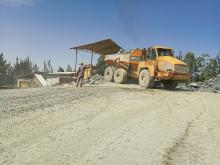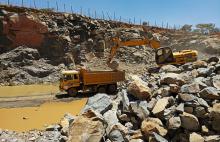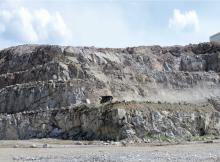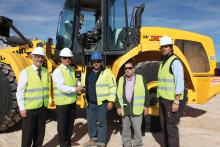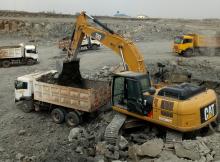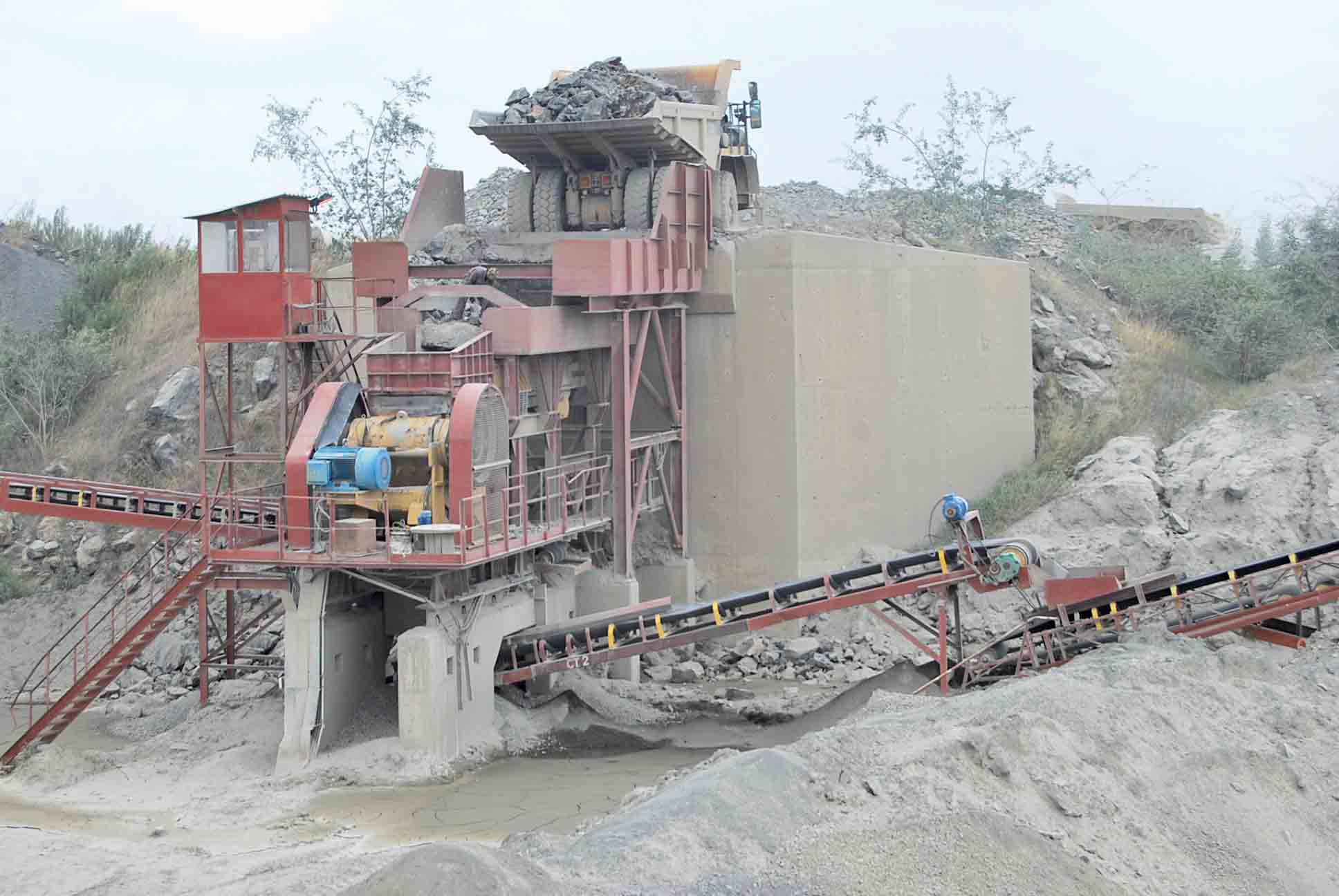
The future looks bright for Kenyan quarry company Aristocrats Concrete Ltd, as Shem Oirere reports.
Quarry operators in East Africa are an optimistic lot as the region’s construction industry continues to show substantial gains in the last five years. And for those in Kenya, a boom in high-rise buildings and expanding Chinese investment has assured quarry operators of better returns, both in the short and medium term.
The skyscrapers that are emerging and altering the skyline of Kenya’s capital, Nairobi, and its surrounding environment are feeding from various quarries spread across neighbouring counties, where new trends for environment safeguarding, material testing, weighing before sale and competition for quality aggregates are changing the market.
Aristocrats Concrete Ltd, a Nairobi-based manufacturer of aggregate, concrete blocks and precast building material has taken advantage of the increasing business opportunities to boost operations at its four-year old 100 hectare quarry at Syokimau in Machakos County, a few kilometers from Nairobi.
“The future of the quarry business in Kenya looks bright as investors anticipate a boom in the next five years because of the expanding construction industry, increasing Chinese investment, preference for high-rise buildings, (probably because of limited urban space), and the embracing of public private partnerships,” says Srihari Raja, the equipment maintenance manager at Aristocrats Concrete Ltd.
The Syokimau-based quarry, which started operations in 2012, is one of the major suppliers of various construction materials especially for projects in Nairobi and its environs.
Aristocrats Concrete Ltd (ACL) supplies crushed stone ranging in sizes from 0mm to 300mm to suit various clients including housing developers and road contractors.
“Cement companies in Kenya have also increased demand for ready-mixed concrete for supply to their clients. We supply them with quality gravel or crushed stone which they mix with Portland cement and water to make the ready-mixed concrete especially for high rise buildings,” says Raja. Of course the preference for ready-mixed concrete means more supply of retarder admixtures to add to the ready-mixed to ensure it doesn’t lose its consumption value.
The company uses two
The excavated basalt is loaded to eight of the company’s six wheeler 40tonne articulated dump trucks that include
ACL’s crushing plant reduces the 1m-1.5m stone to at least 300mm in diameter at the primary level. The stone material is conveyed to the secondary crushing or surge pile before being transferred to a vibrating inclined screen or scalping machine, where oversized rock is separated from smaller ones. At the secondary phase the stone can be reduced to a maximum of 39.8mm, which is the preferred construction material in the Kenyan market.
Four categories of crushed stone material is available at the Aristocrats quarry including sizes 5.08mm-19.8mm, 13.9mm-19.8mm, 5.8mm-8.3mm, 8.3mm-13.9mm, and 0mm-2.8mm.
“Currently the 0mm-2.8mm is what contractors and sand suppliers harvest from river beds but that practice is being banned in the country because of the impact on the environment,” says Raja.
“We believe we can save the environment as quarry operators by crushing more rock at our quarry sites to support the construction industry,” he says.
The ban on river sand mining has, in one way or the other, created a business opportunity for the quarry operators because as Raja says “the more stringent the regulations on river sand mining the more demand there will be for crushed stone sand from quarries.”
ACL supplies aggregate of various sizes that is specific for use in high-rise buildings, where, in most cases, the material is pumped up the building and water acts as a lubricant in conveying it. The quarry, which has capacity to produce between 750,000 and 800,000 tonnes/year, also has specific aggregate sizes suitable for road construction.
“We produce quality aggregate that has been double-crushed to minimise rolling to mix with bitumen for road works,” says Raja.
He said the quarry also supplies 0-14mm grade crushed stone for road sub-base works.
“For the last four years we have managed to ensure our clients get quality aggregate in good time, partly because we have managed to keep a higher time cycle that keeps our equipment productivity to the optimum,” says Raja.
“From the time the excavated stone is loaded on the dumper truck to the time it offloads the material onto a crusher should be planned in such a way that the excavator is not sitting idle nor is the crusher idle waiting for more material to crush,” he adds.
“If one has a 500-tonnes/hour crushing capacity at threshold, it is important to work out how many scoops a loader needs to fill a dumper truck, what is the distance that the truck needs to travel to the crushing site and how long does it take to reach, offload and come back,” says Raja. An accurate calculation of the loading, travel and dumping timings would make it possible to organise how the dumper trucks alternate their operations between the loading and crushing points.
“A quarry operator can acquire a machine that has capacity for 4,000 tonnes, but the returns and its performance can be much below that of one which has a 2000-tonne capacity machine because of poor time cycles,” says the ACL equipment maintenance chief.
And for ACL, Komatsu and Caterpillar is the choice of machinery because, according to Raja, “they are up 90% available and can perform well even after being in service for three years.”
He continues: “Of course, every equipment has a lifespan and whenever we are buying we must consider the operating costs, the service contract, availability of genuine oil/filters and also backup equipment after, say, five years.”
A team of maintenance staff is on hand at the Aristocrats’ quarry for the daily schedule works such as oil changes, major overhauls and unexpected failures.
“We have mechanics that carry out scheduled maintenance while the filtering work is done by service team that must ensure there is no contamination at whatever stage of service,” says Raja, who adds that all teams at the quarry are trained and for some “it has become more of a repeat job so we can only invest in training of new people”.
The maintenance staff at Aristocrats quarry are part of the site’s 63-strong team, which includes four senior staff who have worked out a duty schedule spread over 18 hours in two shifts, with some shifts being less than 9 hours “depending on sales”, says Raja.
With 100 hectares of quarry land, Aristocrats Concrete hopes to be operational for some time. But as Raja says “it all depends on the mineral stone available and the market consumption levels.”
One worrying trend for Raja is the existence of loopholes that create opportunity for some quarry operators to import substandard machines/equipment from Europe, such as crusher plants and trucks.
“The importation of substandard machines/equipment makes the business less competitive. Such quarry operators have invested very little in acquisition of equipment and therefore charge far less than the optimum market price,” says Raja.
He says the machines are “noisy and experience several breakdowns, costing the importers more anyway”, and calls for tough regulation to stamp out substandard equipment.
And finally, Raja says as demand for quality aggregates increases, contractors, especially those undertaking big projects, are beginning to insist on lab testing of aggregates before they buy. The lab testing is confirmation, especially for foreign contractors, that the construction material complies with British standards.


